
|
Journey to Botswana8 October 2012 Journey to Botswana, 20 August till 17 September 2012. It was a very successfull journey. All the targets were reached. Spontaniously new challenges appeared. Some were taken up straight away, others will be taken up later. Even the slow bus ride from Johannesburg to Gaborone (capitol of Botswana) had an interesting consequence. The reason for the slow driving was a faulty fan belt, which ment we had to stop for 10 minutes, drive for 5 or 10 minutes at 15 miles an hour, stop, drive. After an hour we transferred to another bus. We arrived at the border at 0.10 am. The border had closed at midnight and was to re-open at 6 am. A few passengers decided to lodge a complaint at the buscompany's office at the end of the journey and I was invited to join. It was interesting to see how Batswana lodge a complaint. They do that calmly and politely. 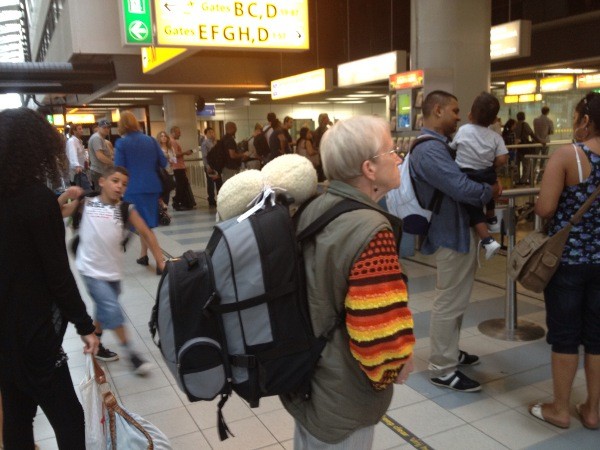 The targets. 1.The hand- over of a bag with clothes, knitting yarns, knitting and crochet needles, sewing needles, pins, thread, buttons etc, money for water, food and petrol, to an inhibitant of a CKGR settlement. This happened outside the CKGR. It was winter in Botswana. During this time it does not rain. It was very dry, and humidity very low. Waterpans had dried up and the field foods were eaten. De car with which this man had come to meet me broke down on his way back, so sadly some of the money had to be used for repairs. He told they were suffering in the CKGR. He himself looked a lot thinner then when we met in April 2012.2.Payment of outstanding bill for car repairs (the cars of inhibitants of CKGR residents) at garage. Checking and taking picture of the Toyota Hilux which is for sale and which we would like to buy for the CKGR people. The first target was completed, the second partly, because I had forgotten to bring my camera and could not take a picture. The car has got a double cabin and a hard cover on the trunk (also called "bakkie").Except for the horizontal crack all over the windscreen (luckily on the bottem) and a few small rusty spots, to someone without knowledge of these matters the car looked quit good.3.Knitted mittens for Jeanette. Winter in Botswana (June till September) can be very cold at night and till 8 am. Temperatures below zero are no exception. During the day it can be between 25 C and 35 C. The mittens were too large for Jeanette, but they fitted Chris perfectly. I succeeded in knitting one mitten for Jeanette. For the second one there was 2 gram wool lacking, this one will be made later. Riana ordered gloves without fingers, so it will be easier for her to work with the laptop in the reception area on winter monrnings.4.Workshop knitting, crochet and French knitting in the Kuru Craft Centre in D'Kar. Wool spinning should have been done too, but there was no wool. At the first attempt to shear a sheep the shearer had done the cutting at random, which made the hairs too short. The wool spinning was postponed. The 12 participants were busy enough with knitting, crochet and French knitting anyway. On Monday afternoon, after my arrival, I placed all the materials I had brought on a table to see what was there. The ladies straight away began to knit and crochet. There was a problem, because an American volunteer had taught them knitting and crochet before. Americans use different knitting and crochet techniques then we do. Sometimes I have adapted their technique to ours, sometimes I left them doing as they did it. A few young women took up the French knitting enthousiastically, during the next three days they were busy with it. On Tuesday, Wednesday, Thursday and Friday we started at 8 am, had coffee/tea while working, had a quick lunch which was cooked by a few of the women. After that I went to my nearby little appartment for 15 minutes. When I returned at the workshop, the ladies were busy again. In the afternoon we had another cup of tea and at 5 pm we had to send them away. On Friday we stopped at 4 pm, so I could have an evaluation of the workshop with the manageress of the Kuru Arts Centre. But first we had to say good- buy to each other. They thanked me with a speech and a song. I was given a necklace, earrings and a card. They very much want me to return next year.5.Workshop woolspinning in Gantsi Craft Centre, Ghanzi. The first day three ladies participated, the next four days two. There was wool carding, wool spinning and twining. A nice, very strong thread has been made. This is short of a miracle, as the hairs were still rather short. Part of the wool was white, coarse and straight as goat's hair, part of it was brown, soft and a little bit wavy like sheep's wool. The two types were carded together. Spinning tops were used for the spinning. Part of the workshop time was used for knitting lessons.6.Search for Bushmen in and around Ghanzi. I found a small group at the Thakadu Farm. Some of them work on the farm. A few of them give tours to tourists, the so called "Bushmen" walk, with the assistence of a translator. They show how they lived in earlier days, which games the children play, what they eat, which carrots, tubers, plants and tree leaves they use as medicines, how they make beads from ostrich egg shells, their clothes from animal hides, fire, etc. Several of these activities are not done any more. Hunting outside the CKGR is prohibited, so it is difficult for them to get hides. There is too little land for them to make continually use of natural materials. Matches and sigaret lighters are easier to make a fire with.The children use car/ bycicle tyres for a hoop. There was a toy car. They also make them of wire or other rubbish. Mobile phones also were there, to listen to music among other things. To my idea, their food is mainly maismeal, beans, bread, oil, sorghum, in short, what you get from the foodstore. If they have not used their money on beer and tobacco. There were three children (age 6-7-9 year) who were left there by their alcohol addicted mother. De woman lived with a few other of her children in New Xade, about 125 km away, a resettlement camp which was created for the people who lived until February 2002 in the CKGR. The three children did not attend school. There was an attempt to register them with the school in Ghanzi. Because they had lived in another place previously, transfer papers had to be collected from there. One of the people was given money to go by bus to collect them, but this was used to buy beer. An attempt will be made to register them for next school year, which is to start in January 2013. I taught them a little bit of English (counting, names of body parts). They loved it but is was very difficult for them. When you are used to create your own games and have heard little or no English before, a language which sounds completely different and has no clicks, you do not quickly understand and speak it. After 1,5 weeks the result was not too bad though. Most days I brought them a little bit of food. After a week I started to pick up some of the rubbish which was lying around their shelters, whith the aid of the three children. In the early days one could throw everything which was no longer needed onto the ground. It were all natural materials and disappeared after a while. You cannot do this with plastic, iron, paper etc. When the children were feeling hot they took off some clothes and their shoes and left them where they had dropped them. The three children looked like they had not had a bath for years. There was a standpipe. In a black sooted watering can I heated water near a "home" fire of one of the occupants. I used the plastic bath that was lying around. The girl was the first one and together with a highly pregnant woman we scrubbed her as clean as possible. After drying her, the woman rubbed vaseline on her hair and body. In the meantime I washed her clothes. Taking for granted that she did not have other clothes I gave her one of my t- shirts, which was for her a dress. The neckline was made smaller with a clothes peg. Later on it turned out that there were other clothes, though they were not much cleaner than the ones she had taken off. During the next days we bathed another three children. With the aid of a translator I told the people about the dangers of alcohol, specialy for young children, tabacco, the many flies that were attracted by the rubbish, specially the animal intestines which were hanging to dry on the fence near their "homes". They all agreed with all that was said. The mother of the three children had turned up two days previously, with a baby on her back. She spontaniously admitted that she was drinking too much. When I returned the next morning at 8.30 am, the pregnant woman was sweeping rubbish together and putting it in plastic bags, the intestines had disappeared, children and men were collecting rubbish outside the fence. Clothes were being washed. The start was there, but for how long? These were the planned targets. Target number 6 became more succesfull then I had dreamed. An extra activity was teaching knitting to the ladies in the Thakadu Farm shop. This took four days from 11.30 am till 2.30 pm. The scarfs which I had brought to sell in the shops at Cairo and Johannesburg Airport, and in a shopping mall in Johannesburg, I left at the Kuru Arts Centre. The sale in Cairo failed because of lack of understanding of the English language by the sales people. At the Kuru Art Centre I bought necklaces, earrings (made from metal bottle caps), magnets to stick on fridges and postcards, to sell in The Netherlands. From the Bushmen at the Thakadu Farm I bought ostrich egg beads, to decorate my knitting in The Netherlands. In the Craft shop of the Thakadu Camp I left a few sets of ovengloves, the proceeds are for food for the people at the farm. In the Big 5 Lodge in Gaborone I sold one set of ovengloves, 15 minutes after they were finished. The money goes to buying the Toyota Hilux. During a few days I bottle fed a very young lamb, but sadly it died. At the Big 5 I helped with finding a way to bottle feed a small rabbit (eyes were not open yet) which had been abandonded by its mother. I attended the divine service of de Hervormde (Reformed) Afrikaan church in D'Kar. The preacher spoke Setswana (official language in Botswana besides English), which was translated by a churchmember, and Afrikaans for the managers of the Kuru Art Centre (and this time for me). The women and a few men sang the hymns beautifully. I also attended an open air meeting of the 7th Day Adventists in Ghanzi. The meeting place was besides the bussation. On a screen was shown the texts of the sermon. Three women took the lead in singing with the aid of microphones which they did extremely well. The spectators were sitting on green plastic chairs. Meetings like these are held regularly in the evenings during fourteen days at a time. This time health was in the picture, this evening the subject was air. The question was: Do we need air and why. Someone was invited to close nose and mouth for a while, and everybody realized immidiately why we cannot do without air. We were told that we need fresh air in the house to get the foul air out, together with dust and bacteries. While inhaling air, you also inhale the spirit of God. The service was in English and was translated into Setswana. The speech was rather vehement, there was no lack of enthousiasme. There was a moment of relaxation too. I was invited to a Lady's Night at the Thakadu Camp bar, for ladies from Ghanzi and surroundings. It started at 7 pm with a glass of Marabula, which reminded me of whiskey cream, fried chips and chickenpieces to nibble while we talked to each other. After that there was a ball game. On both sides of a table tennis table there was a team of 6 ladies. Each team had about 9 cups with some beer in front of them. Team one tried to throw a ball into a cup of team two. Was this succesful, someone of team two was told to drink the beer in that cup. It was not allowed to try to prevend the ball from getting into the cups. We all had great fun. I too had to drink beer, which I do not like. After that there was some dancing and a large cup with more Marabula went round. At 9.15 pm I decided it was enough feasting for me. Later I woke up a few times from the enthousiastic laughter of the party's participants. The party ended around 2 am. The week before the gentlemen had held a party, which ended in a real fight with torn t-shirts, nasty blows and someone trying to strangle someone. When I woke up from the noise, I thought it was made by animals in mating seasson. Then I realized it was not the right time of year for it. For some men it clearly always is mating season. Besides all this I have met many good people, who support people in need, and who have interesting ideas. Also in Johannesburg and in the airoplane from Cairo to Amsterdam. It has made me so much richer, althugh my purse was a lot thinner on my return. Now it is time for a little rest and after that to make preparations for the next trip, around July/ August 2013. I am going to attend the Traditional Dance Festival in D'Kar, which I missed this year because I had booked my plane ticket before I knew it existed. And of course continue with the workshops in D'Kar and Ghanzi, and the support for everybody who needs it. We are hoping to have collected a nice amount of money before July 2013, so we can help even more people, and better, in all sorts of ways. Please continue to look at our website now and again, to see what we are doing to generate money. Our (and the receivers of the help) warm thanks go to everybody who has supported us already. Thank you for reading this journal. 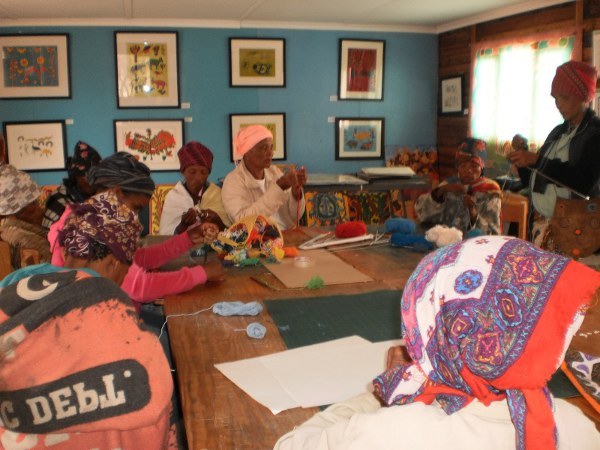 Workshop knitting, crochet and French knitting at Kuru Art Centre. 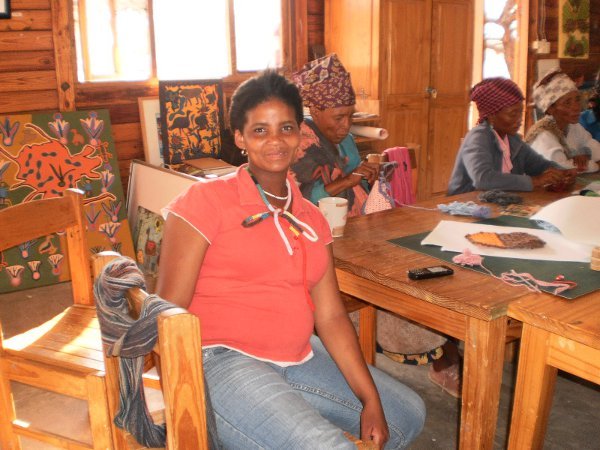 Proud of her French knitting. 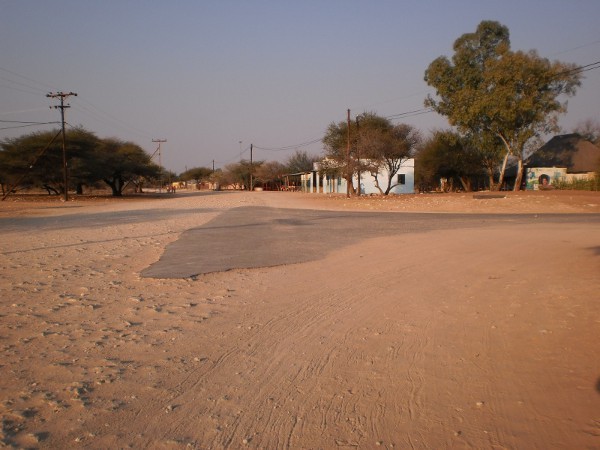 D'Kar. In winter a very dry and dusty place. At the end of the tarmac road to the highway from Ghanzi to Maun, in the west of Botswana. 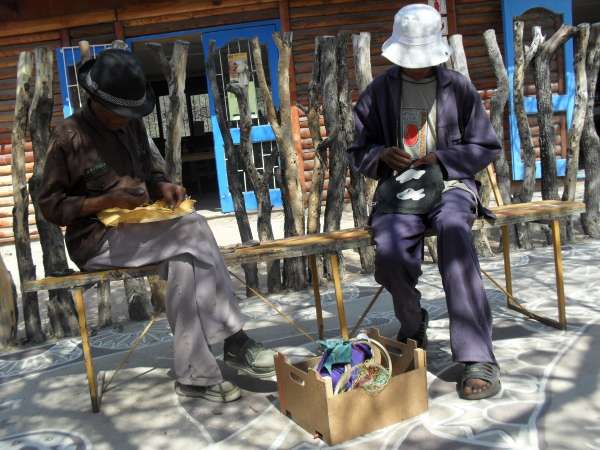 Two men making embroidery on small bags. 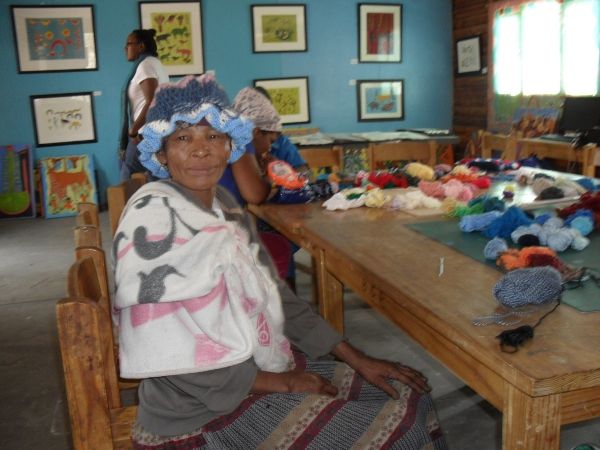 This hat was intended to be a small table cloth, after a while it looked more like a bag. Finally it was a hat. |
About this site
Supporting the Bushmen so they can stay in the Central Kalahari Game Reserve and live there as they wish and as long as they wish. The CKGR was created for them.
Other news
Tourism titans bully Gaolathe, Mmolotsi out of P8 billion
UN expert on Indigenous Peoples’ rights to visit Botswana Human Rights Day 10 December 2024. Botswana. The 2nd Republic of Botswana: Started after elections of 30 October 2024 New government shows respect for all Botswanans, including the Bushmen Govt concedes Basarwa relocation from CKGR was blunder Annual reports 2023 Kgosi Mosadi: Price of victory on her life Blow for Bushman burial case in Botswana’s appeal court Government Denies Family’s Request to Bury Their Father in the CKGR Second travel update Travel update Debswana impoverished us- claim displaced Basarwa Debswana denies compensation claims by Basarwa UN grill Botswana on death penalty Auction of Botswana diamond Warning for the sending of parcels to Botswana UK based rights group Survival International renews fight against Botswana government Tents and firewood for San Communities in Ghanzi. The need for more tents is still great COVID-19: Tents for San community in Ghanzi to relieve overcrowding in houses and huts
Facebook
|
Cookie free - This website doesn't use cookies

